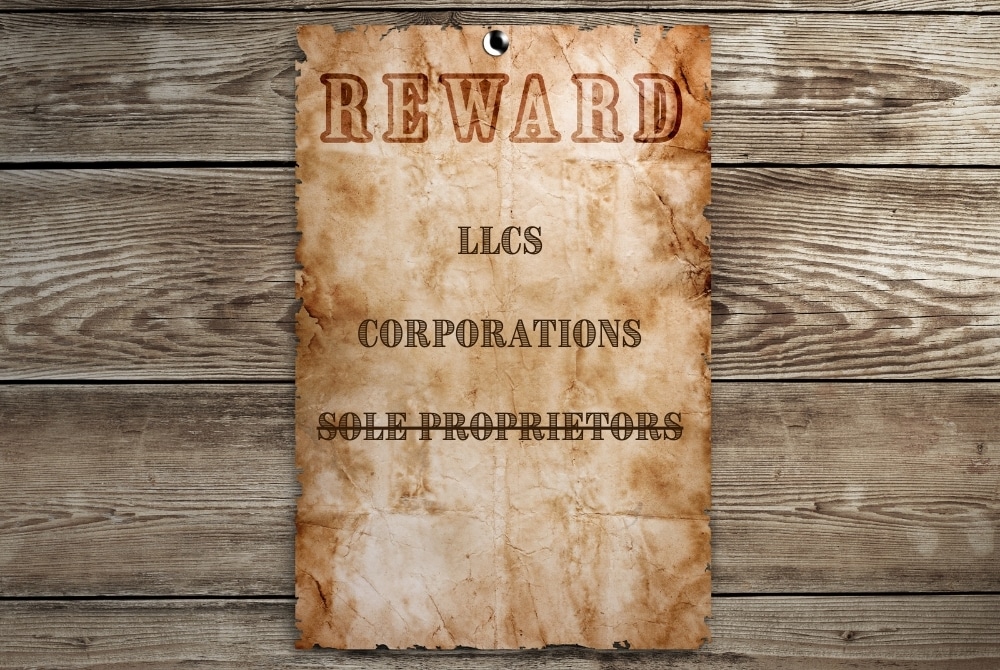
Sole Proprietorships in Florida: The Good, the Bad, and the Ugly
Maybe you’re a freelancer and you want to keep things simple, but you also want to brand yourself to help get more work. Or perhaps you’re just a single person with a really cheap idea for a product or service that you want to provide on your own.
If you’ve never created a business before, there’s a decent chance that operating a sole proprietorship might be the first thing that occurs to you. After all, it is the simplest form of a business, and there’s just one of you – makes sense, right?
Not to us.
While there are a few theoretical positives about operating as a sole proprietorship that we will cover below, in general our stance is that there are pretty much always better options.
Why? Check out the video below.
Why We Never Recommend Forming a Sole Proprietorship
Read Transcript
Hi. This is Barry Haimo. Thanks for tuning into another dose of Bite-Sized Bits of Knowledge, where we give you meaningful information in a short amount of time. Today we’re jumping into the first of five types of business entities, called the sole proprietorship.
Sole proprietorships are really the simplest form of doing a business. Let’s talk about how they work.
So, to start, a sole proprietorship has no real filing. There’s no formation of an entity. It’s really just you doing business either under your name or business name, but it’s just you. There’s no separation.
You’re limited to one owner. Just you. If you want to raise capital, you really got to pull it out of your own pocket and I’ll explain why in a moment. If you pass away, your business dies, your business dies with you.
Operationally, there’s very few requirements, so it’s easy. Management? Congratulations, you’re the boss. You’re in full control of the operations of the business. Liability is one of the biggest weaknesses, I think, of sole proprietorships, if not the biggest weakness. You are fully liable for the debts of the business, the liabilities of the business.
So if that business gets into trouble, has a contract, has a lease, has anything, slip and fall, the business and you are now one. So both of the business and you are on the hook. And that’s a problem. That’s something I think should be avoided at all times.
Taxation, you know, you’re taxed only once. It flows through to your personal 1040, schedule C. And so it’s arguably good taxation, but actually it’s not as good as others. In terms of transferring your interests, yes, you can transfer interest, but really transferring your assets. Like the name, trademarks, the intellectual property, your customer lists – your assets, so to speak. You’re really not transferring a company, because there is no company.
In terms of allocations of available cash, it just goes through to your other pocket. It’s really just you. So there’s no issues there. To terminate it, to dissolve it, it’s easy. It’s really the easiest way – it’s the easiest entity to dissolve, which is the same way to close the business. Generally we call it dissolving it.
In terms of who it’s best suited for, I’d recommend it really be limited to a single business owner or single owner business. Really, like a lemonade stand and even a lemonade stand I wouldn’t recommend because there’s still liability exposure there and I see no reason to do that. There’s too many other options. So in my opinion, you never want to do a sole proprietorship, just never.
In the next video, we’re going to talk about general partners or general partnerships, which is very similar in many respects to the sole proprietorship. So check out the Free Florida corporate formation checklist. The link is in the description.
And thank you for stopping by and stay tuned for more.
Even though we have pretty strong feelings against sole proprietorships, we do want to make sure we’re painting a fair picture. For that reason, we’re going to make a pro and con list.
Pros and Cons of Having a Sole Proprietorship in Florida
Most of these reasons – both for and against – we touched on in the above video. However, we think it’s only fair to cover them a bit more in depth here:
5 Good Things about Florida Sole Proprietorships
- They’re easy to form. Essentially, start doing business. There – you’ve formed a sole proprietorship. Many people “form” sole proprietorships without realizing it, because as soon as you start taking money for products or services on your own, you have created a business. And by default, that business is a sole proprietorship.
- No paperwork required. This kind of falls under the umbrella of #1, but it seemed worth pulling out. Unlike with other business types, where you must register and create various types of governing documents that detail how your business will operate, sole proprietorships don’t have to do any of this. Good for you!
- No fees (probably). Unless you do business under a fictitious name, Florida doesn’t require you to pay any fees to get your business up and running or to continue operating. This is not true for other business types, which may end up owing hundreds in fees
- You’re in total control! No business partners, investors, stockholders, employees – when it’s just you, no one can tell you “No” or slow down the decision-making process.
- Taxes are simple because you are your business. Unlike with other structures, sole proprietors report their business income as their income, so you’re taxed just like any self-employed person would be.

5 Reasons Those “Good” Things Still Aren’t Worth It
- Sole proprietors are personally liable for business debts and obligations. This means that any creditors can go after your personal assets to cover any judgments or debts that are incurred by you, your employees, or your business. Yikes!
This is not true for corporations and LLCs, because they are legally separate entities. Just because your business is in debt doesn’t mean you are. That’s probably enough of a reason to form something other than a sole proprietorship on its own.
- Getting funds is harder. With other business types, you can attempt to raise money by selling ownership interests or stocks. This is common, and many investors will flock to put money into a company they believe in when there’s a clear path for them make that money back – and more.
If you have a sole proprietorship, these things are not an option. You can still look for investors, but it’s a much harder sell. Most likely, you’ll be relying far more on personal loans, which means you’ll be on the hook for all of that money.
- Fewer tax deductions. Yes, sole proprietorship taxes are “simpler.” But that’s not always a good thing. LLCs and corporations are allowed to make all kinds of deductions that sole proprietors aren’t, which means there are all kinds of ways to lower business taxes.
- Sole proprietorships are seen as less professional. Fair or not, unincorporated businesses are often taken less seriously and seen as less professional by established businesses. You could end up losing out on work, because they assume you’re not as good as an incorporated competitor.
- It’s harder to sell when you want to. Eventually, you’re going to retire, and if you are a sole proprietor who has manage to create a strong brand, you may wish to make a little extra for your nest egg by selling your business or merging with another.
Unfortunately, you will likely discover that this is difficult, because it is notoriously hard to put a value on sole proprietorships. Do you have clear, transferable processes? Will customers continue to work with your business once the person who has been the face and the driving force – you – is no longer around? These are all bigger questions with sole proprietorships, and they can result in you having to sell for a far lower price than you expect.
Just Incorporate

The long and short is that it really doesn’t make sense to ever be a sole proprietorship; not even for a lemonade stand. Why? Well, because even lemonade stands have liability exposure. Why open that up to your personal hard-earned assets? It’s not overly financially burdensome to form and maintain a company. As to which company, stay tuned to the next few videos.
Meanwhile, don’t forget to download our FREE Florida business entity comparison chart.
In the above video I called it a corporate formation checklist, but really this is a chart designed to let you figure out what kind of business structure is right for you.
Want more personalized advice on forming a business? Reach out to our office today to speak with an experienced Florida business planning attorney.
Originally published 11/11/2021. Updated 03/26/2024.
Author:
Barry E. Haimo, Esq.
Haimo Law
Strategic Planning With Purpose®
Email: barry@haimolaw.com
YouTube: http://www.youtube.com/user/haimolawtv
YOU ARE NOT OUR CLIENT UNLESS WE EXECUTE A WRITTEN AGREEMENT TO THAT EFFECT. MOREOVER, THE INFORMATION CONTAINED HEREIN IS INTENDED FOR INFORMATIONAL PURPOSES ONLY. EACH SITUATION IS HIGHLY FACT SPECIFIC AND EXCEPTIONS OFTEN EXIST TO GENERAL RULES. DO NOT RELY ON THIS INFORMATION, AS A CONSULTATION TO UNDERSTAND THE FACTS AND THE CLIENT’S NEEDS AND GOALS IS NECESSARY. ULTIMATELY WE MUST BE RETAINED TO PROVIDE LEGAL ADVICE AND REPRESENTATION. THIS INFORMATION IS PROVIDED AS A COURTESY AND, ACCORDINGLY, DOES NOT CONSTITUTE LEGAL ADVICE.